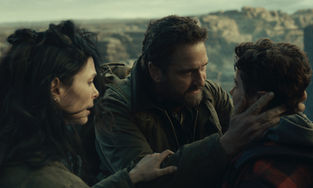'Halloween Ends' Review: November Can't Come Soon Enough For Jamie Lee Curtis' Laurie Strode
- S.J.

- Oct 19, 2022
- 3 min read
Updated: Oct 28, 2023

A year after the events of 2021's 'Halloween Kills' in the town of Haddonfield, a young man named Corey Cunningham (Rohan Campbell) shows up to local family's house for babysitting duties, starting a chain reaction of tense situations that lead him to cause the death of a child accidentally, for which he is charged with manslaughter.
About three years later, Laurie Strode (Jamie Lee Curtis) is writing a memoir which details her encounters with one and only Michael Myers (James Jude Courtney, Nick Castle) who hasn't been seen terrorising the town now in nearly four years. Feeling some kind of affinity towards Corey, Laurie ends up introducing him to her granddaughter Allyson (Andi Matichak) who together strike up a connection, having both endured traumatic situations. However, once Corey comes across Michael, this sets in motion a killing spree where by using his tactics, Corey can retaliate against those who have wronged him or Allyson, before Michael follows for one final confrontation against Laurie.
In Halloween Ends, director-writer David Gordon Green and co-writers Paul Brad Logan, Chris Bernier and Danny McBride attempt to close the chapter of Laurie and Michael's clash of 40 years, while introducing a lot of new elements into the mix. Ambition? Certainly there. Results? Certainly messy. For what it's worth, Green makes really interesting left turns in this film that will at least intrigue and entertain you for a while as you await for what comes out of them. Best example is with Corey and Allyson's relationship where the film swings to neo-noir territory and explores the evolution of evil, as Laurie says at one point: ''Evil doesn't die, it just changes shape''. In the final 20 minutes, it also pays off the promise of this being Laurie's—and also Curtis'—last dance with her boogeyman, resulting in a pretty nasty sequence that also succeeds because of the actor's commitment and efforts.
Rest of the movie is much less successful in almost every way possible as those moments that have inventive ideas for the franchise are quickly reduced to cringeworthy snapshots. Your worst fears about a movie having four writers come to life as the dialogue is watered down so much that it just becomes dull and full of clichés. Most of all it affects the character of Allyson who seemingly gets a complete makeover as she's used only for plot convenience, which then often sidelines Laurie—whom these sequels are supposed to be about—for way too long.
It also doesn't help that Allyson's scenes are spent with Corey where any sort of fashionable sense of Green's direction or Tim Alverson's editing are thrown out the window. These scenes feature merely objects rather than humans with emotions or character growth, and even the violent music by John Carpenter, Cody Carpenter and Daniel Davies can't hide the fact that a lot of shots don't tell you anything about anything. They just help to make it painfully obvious that the last 20 minutes of this movie maybe should've been the end chapter of the first sequel since most of this film clearly isn't in conversation with what came before.
Smileys: Tone
Frowneys: Directing, dialogue, editing, characterisation
[Michael's lawyer] - You want to sue her? [Michael] - I do want a sewer.










